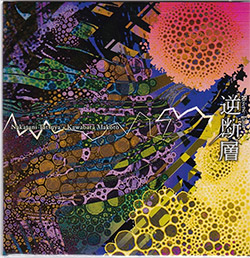
Say I'm an ad guy and am tasked with creating a thirty-second visual teaser to represent Reverse Fault. I would need footage of the following: time-lapse video of scientists dropping things into beakers and reveling in the aftermath; a busy smithery with hammers and sparks flying, possibly portrayed with a Lord of the Rings, dwarven fervor; a hydraulic press punching and cutting sheet metal; ghosts.
Alone, Tatsuya Nakatani's signature work is big. Physically and metaphysically, his enormous wind gongs — even when he brings only one — transform a space with stifling/freeing sustained tones via bowing and the occasional thunderous pulse. However, he's a gentle giant, nimble and thoughtful, rarely overwhelming in a sonic sense, and a devotee to Ma. Immaculate sums it up.
Acid Mothers Temple founder Kawabata Makoto's initial reason for starting that band was to make "trip music," defined as quasi musique concrete, tape music influenced by Stockhausen with the purpose of, as you guessed, making you feel drugged and temporarily unstuck from reality. A recent local AMT performance — a six-person, thirty-minute vamp on a single "chord" — left us all exhausted and deaf but glowing, with my intoxicated friend exclaiming, "That was a gift!" before tearing a parking sign off a wall. Like any good band leader, Kawabata's ideas presented via that particular group are not so much large as pressing, pivoting, eel-like, often camouflaged under a band of people trying to be as rowdy and seen as he.
Reverse Fault isn't a matter of speed or the most-notes-per-minute "free" approach of, say, a Corsano/Flaherty, as there is rarely an obvious forward-leaning development, exposition, or interdependence in this nebulous set. Kawabata's folk, rock and psych methods are twisted and stripped of idiosyncrasy under Tatsuya's largely meter-less work which, summed up, embraces myriad acoustic ways to go from modest pings to booming feedback; his contributions are often a lightning-fast imitation or shadow of the sound a cohort just made. But despite the intense and chaotic nature, nothing seems like an accident or tangential aesthetic shift after playing a wrong note. With each piece, you feel like you've stumbled into the middle of something; disoriented yet fascinated.
There are several grounding passages, such as "An Inquiry into the Meal," the track most likely to be called a jam. Kawabata utilizes actual picking, chords and a buttery guitar setting for some loose jazz over Tatsuya nimbly attacking a proper drum kit. However, despite the formal construction, the work still sounds like it's going in a circle (that chord progression isn't progressing) or a few minutes plucked out of a larger work. That reads as negative, but it's more curious and adheres to the uniqueness of this record — call it Post Post-Rock, or IPR (Informed Post Rock). Here are two veteran artists unlearning what they have learned and learning what the other has to offer in real-time. Make sense?
Also tucked in there are Ma moments, such as "Perplexed Goose Flash," which features a theremin-like wiggling of strings to summon an elevated spectral voice (Makoto doing a lot of modified slide guitar). It soars above while Tatsuya accompanies with ringing echoes and juicy thuds, everything realizing like an alien Opera Seria. "The Spider of Unknowing," based in bowls, bells and a bit-reduced guitar tone, resembles a score for clocks written in the voice of Webern.
(Sidenote: One of the more impressive tricks in Tatsuya's bag is an ability to produce something between a French horn and a Viking horn (aka Gjallarhorn) by blowing into a cymbal perched on a snare. It's both gorgeous and nervous, as the tone is volatile and can either rattle your ears or fall apart on a whim. It is a sound that, when it starts, makes doing anything other than listening feel unimportant. Check out "Mackerel's Revenge" as an example.)
Tatsuya Nakatani and Kawabata Makoto have made an album of intensity, strangeness, with few cadences, and something that captures the energy of a singular live set. If you like your music to rip you out of where you are, this one is enough to outrace even the most persistent, intrusive internal monologue.
Comments and Feedback:



More Recent Reviews, Articles, and Interviews @ The Squid's Ear...


|

